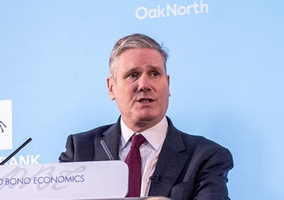Labour cannot promise an “immediate injection of funding” into the charity sector if it is elected at the next election, its shadow culture secretary has said.
Thangam Debbonaire told an event yesterday that a Labour government would bring “a new focus and appreciation for charities” and a “reset in the relationship between civil society and government” but not necessarily more funding.
Asked how prominently charities would feature in the Labour Party manifesto, Debonnaire said the document would be short because “long manifestos don’t get read” so “do not expect much”.
Like Labour leader Keir Starmer recently, Debbonaire defended the RNLI and National Trust from recent criticism.
Meanwhile, chief executive of homelessness charity Crisis Matt Downie told the event that charities should offer solutions more in their campaigns instead of complaining.
‘I want to be your champion in government’
Speaking at NPC’s State of the Sector launch, Debbonaire said that her party wants to tackle the root causes of the issues charities address.
Debbonaire said: “If we are elected, I can't promise an immediate injection of funding.
“But I can promise, and I want to only say the things that I can really deliver on, I can promise a new focus and appreciation for charities, your role in nurturing and building the resilience of local communities.
“A reset in the relationship between civil society as a whole and government and a focus on the role of volunteer volunteers in changing our country for the better the partnership that they are taught.
“We don't underestimate the challenges that you and we all face. We know that we need a renewed social contract as part of a decade of national renewal.
“You have consistently held up your end of the bargain. But the last 14 years of chaos division and crisis from successive conservative governments have stretched charities beyond their limits as the figures show. They've damaged our collective identity and the spirit of service in this country.”
Debbonaire said that the current government is “getting themselves muddled up in culture wars of their own making”.
“In choosing to attack charitable institutions like the National Trust, the RNLI, they are attacking something central to our national identity, and alienating people.
“And I imagine that for many of you, they've alienated you as well - the organisations that just get on with serving our communities, because you should be able to speak up about the injustice in the lives of the people you serve, without any fear of recrimination and are proud of the fact that you have found those ways, and government should want to hear from you. And I do.
“I want to be your champion in government, to take your incredibly rich evidence and experience and to make better policy. Policy designed to improve the lives of people up and down the country, rather than policy designed to punish and restrict.”
Sector ‘taken for granted’
Before becoming an MP, Debbonaire spent 26 years working in domestic violence charities before becoming the Labour MP for Bristol West in 2015.
“I feel like I really do know in my bones, what the value of civil society is, of charities, of faith groups that are in so many ways, the same as the values that we have in the Labour movement,” she said.
She thanked the sector for its work which she feels often goes “unnoticed, uncelebrated and unpacked”.
“It’s now time for a decade of national renewal, and that's what you can expect from the Labour Party if we're elected this year,” she said.
Debbonaire said she is committed to working in partnership with the sector to address the issues they aim to solve.
“I’m guessing like many of you dream of a time when you're not necessary. We used to say in the domestic violence group, one day we won't be needed, but we're a very long way off yet.
“And I think for a lot of us that's the dream – of being in a world where homelessness charities are no longer needed and it feels so far off.
“It’s something we wanted to focus on, the prevention aspects. We want to encourage and champion social entrepreneurs, we want to set long-term targets and work with you to achieve them.”
NPC’s State of the Sector report estimated that charities subsidise public services by £2.4bn a year.
Debbonaire said the findings of the report speak of “a successful sector which has been taken for granted in my view”.
“If Britain elects a Labour government this year, that will end,” she said.
Crisis CEO: ‘As a sector, we have got used to complaining too much’
Meanwhile, Crisis CEO Downie told the event: “There's a bit of perception from a bit of the press that we should just keep quiet, but let’s totally ignore that.
“And actually, I would say that, perhaps as a sector, we've got used to complaining a bit too much.”
Downie referenced the amount of sector criticisms he had seen of the government’s net zero plan but said he had not seen the sector proposing different solutions.
He said the relationship between the state and civil society was “muddled” as some organisations are too close to government while others are adversarial to it.
“I do think there are some natural tensions however, between the state and the sector, and we should embrace them,” he said.
“There's a tension between the idealism of our causes, and the practical fiscal political realities that politicians and civil servants face.”
Downie asked that the next government “catches up with the reality” of the current charity sector.
He said: “It's perhaps time for the sector to come out from behind the sofa, to assert a mature and productive relationship with the state, to boldly talk about our causes and solutions to our issues, whether or not they fit neatly into our limited objects.”













